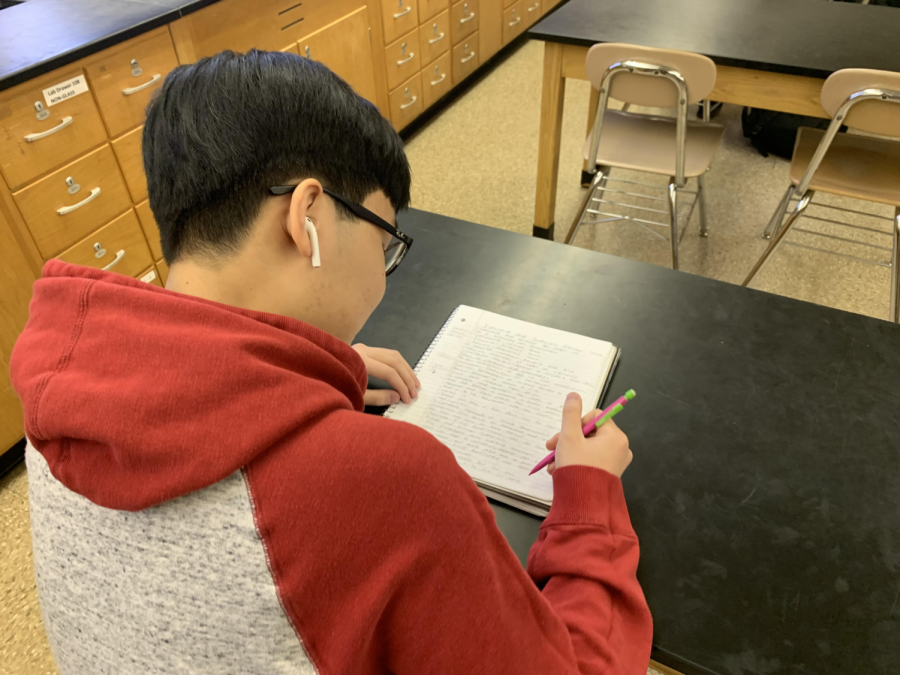Nick’s quick tips for exam season
NPHS student Cody Luong reviews notes for an upcoming exam.
It’s exam time! Whether you have final exams for semester classes or mid-term exams for full-year classes, chances are you will be studying for a test that has a major impact on your grade over the next 2 weeks.
What are the best ways to study for exams? It depends on what works for you. Below are some tips from fellow North Penn students.
When to study:
Some students, like North Penn senior Jon Lee, prefer to study or “cram” the night before the exam. Others, like North Penn seniors Cody Luong and Liv Farrell, tend to space out their studying over multiple nights and mentioned taking advantage of free time in their busy weekly schedules. The length of study time spent studying varies among students, but it seems like spending more time on courses that are harder is common. Studying a day or two before the exam can generally make material fresher in your head when you take the test. Starting two days ahead of the exam allows you to review material the first day and see how much you recall on the second day.
Where to study:
Different students prefer different study environments. Jon Lee studies in his room and likes to study in the same place every time. Cody Luong picks different rooms, but he definitely prefers quiet places in his house. Liv Farrell might be found studying in her room or at Starbucks or Barnes and Noble.
“I think going somewhere other than my house is a good change of scenery because my house can get really loud and distracting,” Farrell said.
Farrell points out a key feature of study environments. While some people prefer quiet and others like a little background noise, the most important thing is for the study space to be free of distractions, so you can focus.
Study groups help some people study better. However, if you like to study with a group, it’s important to make sure you spend enough time on the topics you personally need to reinforce and not just on the topics the rest of the groups want to concentrate on. One nice feature of studying with others is that teaching others a topic you understand can really help you study it more effectively as well.
How to study:
Having a study plan and studying in an organized fashion are best practices. Jon Lee focuses on prior homework and tests.
“I study by going on Canvas and reviewing the notes the teachers post or going over the homework problems or quiz problems I already did. I find that reviewing tests and quizzes again helps me learn from my mistakes,” Lee explains.
Experts agree that reviewing prior tests, quizzes and homework is a good place to start studying. It is a quick way to identify what material you remember well and what material you have more trouble with and need to spend more time studying. It also reminds you of how the particular teacher likes to phrase test questions.
Cody Luong also looks through notes and slides on Canvas. A good technique for studying from class notes is to review a section then pause and write down everything you remember from that section. This tests your recall of the material, which is what you need on the test.
Liv Farrell has an effective way to use the study guides her teachers provide.
“Once I answer all the questions, I’ll make a quizlet to study. I think the quizlet makes studying a lot easier because seeing the questions over and over again helps me remember them.” said Farrell.
Quizlets and flashcards from study guide material or class notes are really good ways to help you memorize information you will need on the test. Mnemonic devices (like putting a fact you need to remember to the tune of your favorite song or picking a phrase where the first letter of each word reminds you of a certain item in a list you need to memorize) are also good ways to help yourself memorize difficult-to-remember topics.
Other tips for how to study well include taking periodic breaks and studying the hardest material when you have the most energy.
Speaking of energy, you may wonder whether you should prioritize studying or sleep the night before the exam. Cody Luong and Jon Lee try to prioritize sleep. Liv Farrell tries to get extra sleep, but if she feels like there’s something she still doesn’t understand, she’ll sacrifice some sleep for some extra cramming. Farrell raises a good point. If you are nervous that you still aren’t comfortable with certain material, a little more studying is probably the way to go, since you are not likely to get good sleep if you are really nervous. However, it seems like a good idea to at least get enough sleep the night before the exam to help you think clearly when you get to a test.
Good luck to all with exams coming up!


